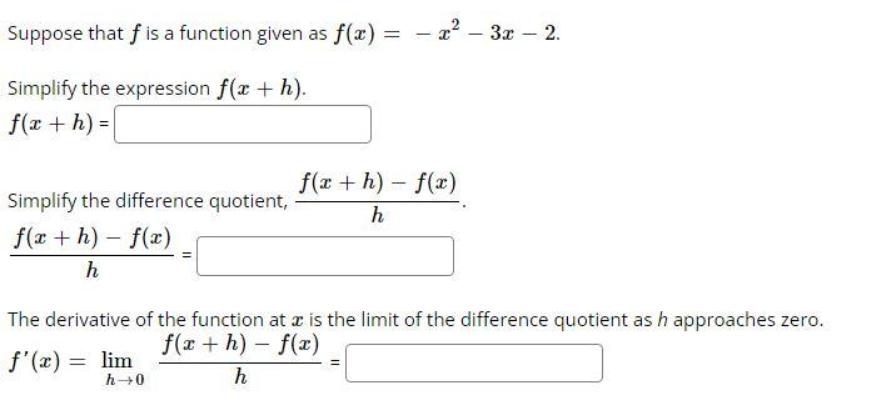Question
Suppose that f is a function given as f(x) Simplify the expression f(x + h). f(x + h) = Simplify the difference quotient, f(x

Suppose that f is a function given as f(x) Simplify the expression f(x + h). f(x + h) = Simplify the difference quotient, f(x +h)-f(x) h - x-3x - 2. - f'(x) = lim h0 f(x +h)-f(x) h The derivative of the function at a is the limit of the difference quotient as h approaches zero. f(x+h)-f(x) h
Step by Step Solution
3.42 Rating (152 Votes )
There are 3 Steps involved in it
Step: 1

Get Instant Access to Expert-Tailored Solutions
See step-by-step solutions with expert insights and AI powered tools for academic success
Step: 2

Step: 3

Ace Your Homework with AI
Get the answers you need in no time with our AI-driven, step-by-step assistance
Get StartedRecommended Textbook for
An Introduction to Analysis
Authors: William R. Wade
4th edition
132296381, 978-0132296380
Students also viewed these Accounting questions
Question
Answered: 1 week ago
Question
Answered: 1 week ago
Question
Answered: 1 week ago
Question
Answered: 1 week ago
Question
Answered: 1 week ago
Question
Answered: 1 week ago
Question
Answered: 1 week ago
Question
Answered: 1 week ago
Question
Answered: 1 week ago
Question
Answered: 1 week ago
Question
Answered: 1 week ago
Question
Answered: 1 week ago
Question
Answered: 1 week ago
Question
Answered: 1 week ago
Question
Answered: 1 week ago
Question
Answered: 1 week ago
Question
Answered: 1 week ago
Question
Answered: 1 week ago
Question
Answered: 1 week ago
Question
Answered: 1 week ago
Question
Answered: 1 week ago
View Answer in SolutionInn App



